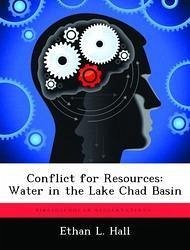This monograph discusses the propensity for conflict surrounding the diminishing water in Lake Chad. The shortage of water in the lake and its basin threatens regional economic development and the existence of the population in the area. The paper uses a comparative case study to determine the extent that states conflict over scarce natural resources. The first case study examines the dispute over possession of the Spratly Islands located in the South China Sea. The Spratly Islands and the South China Sea may possess significant oil and natural gas deposits. The island chain is also claimed by multiple states with interstate conflict between China and Vietnam over legitimate possession. The second case study examines the potential for conflict within the Lake Chad Basin. Lake Chad lies within four African states, Nigeria, Niger, Cameroon and Chad. These riparian states require water from the lake to support the population's drinking, agriculture, livestock and sanitation. Since 1960, Lake Chad's water has receded. Population increases, climate change, desertification, regional conflict and manmade water catchment projects compound the regional shortage of water.
Bitte wählen Sie Ihr Anliegen aus.
Rechnungen
Retourenschein anfordern
Bestellstatus
Storno









